
It takes guts and chutzpah to write a musical about a hundred-year-old anti-Semitism-fueled lynching that remains today one of the most horrific miscarriages of justice in United States history, but this is precisely what Jason Robert Brown and Alfred Uhry pulled off in 1998’s Tony-winning Parade, now being given a Cal State Northridge revival that easily rivals the best our top SoCal regional theaters have to offer.
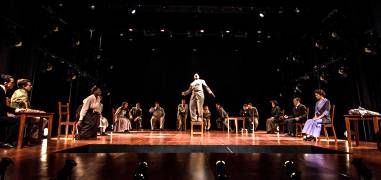 Brown’s powerful, eclectic collection of songs run the gamut from gospel to pop rock to rhythm and blues to emotional ballads. Likewise, no one writes with more insight about being Jewish in the South than Uhry, whose book moves back and forth through time, as flashbacks reveal the events leading up to Frank’s arrest and trial.
Brown’s powerful, eclectic collection of songs run the gamut from gospel to pop rock to rhythm and blues to emotional ballads. Likewise, no one writes with more insight about being Jewish in the South than Uhry, whose book moves back and forth through time, as flashbacks reveal the events leading up to Frank’s arrest and trial.
In a stirring prologue, a young confederate soldier (Lance Amann) sings a hymn to Georgia, by the end of which he has morphed into his elderly contemporary self (Robert Murray), a reminder that the Civil War was no distant memory at the time of Frank’s trial, but a very real one for the citizens of Atlanta.
Parade’s tale of injustice then begins, with young Frankie Epps (Amann) inviting pencil factory worker Mary Phagan (Tianna Cohen) to “The Picture Show,” a date for which Mary never arrives. Since we have just seen her visit the office of factory manager Leo Frank (Daniel Bellusci) to claim her week’s meager wages in a scene that Parade’s book cuts deliberately short, it is left to us (and to the citizens of Marietta) to fill in the blanks, though in markedly different ways.
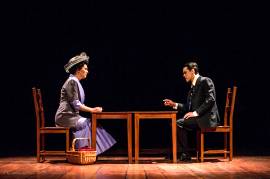 Evidence soon piles up against the “Yankee Jew,” much of it coming from janitor Jim Conley (Robert Collins), damning albeit falsified evidence that ultimately leads to Leo’s arrest for murder and the kangaroo court that was his trial. Meanwhile, his mouse of a Southern Jewish wife Lucille (Skye Privat) informs her flabbergasted husband of her intention to leave town during his trial, a decision whose ultimate reversal is merely the first step in Lucille’s transformation from cowardice to courage.
Evidence soon piles up against the “Yankee Jew,” much of it coming from janitor Jim Conley (Robert Collins), damning albeit falsified evidence that ultimately leads to Leo’s arrest for murder and the kangaroo court that was his trial. Meanwhile, his mouse of a Southern Jewish wife Lucille (Skye Privat) informs her flabbergasted husband of her intention to leave town during his trial, a decision whose ultimate reversal is merely the first step in Lucille’s transformation from cowardice to courage.
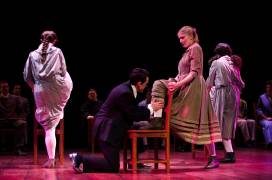 In court, prosecutor Hugh Dorsey (Hank Doughan) interrogates a trio of young factory girls (Emily Blanco, Alissa Finn, and JayCee Porter) who testify under oath that Leo had invited Mary to “Come Up To My Office,” incriminating evidence accompanied by a vivid fantasy depiction of the sex fiend the townsfolk of Marietta believe Leo to be. Mary’s mother (Lulu Mack) then takes the stand, after which Conley concocts the elaborate lie that seals Frank’s fate.
In court, prosecutor Hugh Dorsey (Hank Doughan) interrogates a trio of young factory girls (Emily Blanco, Alissa Finn, and JayCee Porter) who testify under oath that Leo had invited Mary to “Come Up To My Office,” incriminating evidence accompanied by a vivid fantasy depiction of the sex fiend the townsfolk of Marietta believe Leo to be. Mary’s mother (Lulu Mack) then takes the stand, after which Conley concocts the elaborate lie that seals Frank’s fate.
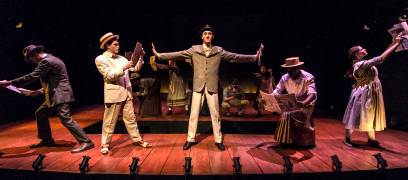 Broadway’s Parade featured a cast of 35, later cut down to 15 for the scaled-down London revival that played the Mark Taper Forum a few years back, one that lacked the scope of the original or its sense of an entire town aligned against a single man.
Broadway’s Parade featured a cast of 35, later cut down to 15 for the scaled-down London revival that played the Mark Taper Forum a few years back, one that lacked the scope of the original or its sense of an entire town aligned against a single man.
Production helmer Kari Hayter fixes that major flaw with just four more cast members than the revival by keeping just about everyone onstage through much of the production as witnesses, as judges, and as jury, both literal and figurative.
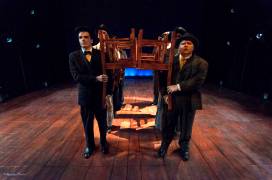 Budget constraints may have prompted Hayter’s decision to direct and choreograph Parade on a nearly bare hardwood-floored stage, with only a dozen or so straight-back wooden chairs and a few tables brought on in various numbers and configurations to stand in for assorted scene pieces and in one particularly striking instance, for a coffin being held high atop pallbearers’ shoulders, but it works, adding a surreal quality that matches Leo’s Kafkaesque dilemma to perfection.
Budget constraints may have prompted Hayter’s decision to direct and choreograph Parade on a nearly bare hardwood-floored stage, with only a dozen or so straight-back wooden chairs and a few tables brought on in various numbers and configurations to stand in for assorted scene pieces and in one particularly striking instance, for a coffin being held high atop pallbearers’ shoulders, but it works, adding a surreal quality that matches Leo’s Kafkaesque dilemma to perfection.
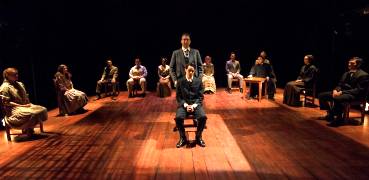 Particularly impressive is Hayter’s staging of the extended courtroom sequence that ends Act One. As each new witness takes the stand, the seating arrangement changes, a visually stunning series of altered perspectives that compound Leo’s steadily darkening nightmare, with Hayter’s stylized choreography adding to the production’s electric impact.
Particularly impressive is Hayter’s staging of the extended courtroom sequence that ends Act One. As each new witness takes the stand, the seating arrangement changes, a visually stunning series of altered perspectives that compound Leo’s steadily darkening nightmare, with Hayter’s stylized choreography adding to the production’s electric impact.
As for the musical’s climactic scene, Hayter’s less literal approach only adds to its dramatic wallop. In other words, expect to be shattered as never before.
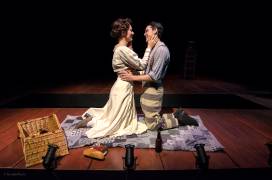 Leading man Bellusci more than fulfills the promise of his Musical Theater Debut Of The Year Scenie a few years back, the depth and power of his performance as Leo, warts and all, belying his 21 years of age.
Leading man Bellusci more than fulfills the promise of his Musical Theater Debut Of The Year Scenie a few years back, the depth and power of his performance as Leo, warts and all, belying his 21 years of age.
Opposite him, the equally sensational Privat gives Lucille the beauty, stage presence, and acting/vocal chops of a Broadway star.
Together the twosome will break your heart, and never more so than in their deeply moving, gorgeously sung “All The Wasted Time.”
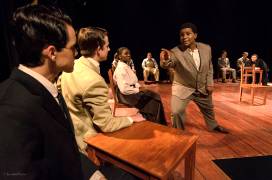 A number of supporting players do the kind of work that wins awards, beginning with recent CSUN grad Collins’ showstopping turn as Jim Conley, his “That’s What He Said” and “Blues: Feel the Rain Fall” both scoring well-earned cheers.
A number of supporting players do the kind of work that wins awards, beginning with recent CSUN grad Collins’ showstopping turn as Jim Conley, his “That’s What He Said” and “Blues: Feel the Rain Fall” both scoring well-earned cheers.
Doughan’s layered performance makes conviction-hungry prosecutor Dorsey Hugh Dorsey the furthest thing from a stock villain, Amann’s peppy Frankie and heartfelt Young Soldier reveal stage presence and pipes, and Mack stands out too in a pair of distinctive roles, as the vivacious Sally Slaton and as a gut-wrenching Mrs. Phagan.
Matthew Kesner is engaging as eager-beaver reporter Britt Craig and as obliging prison guard Mr. Peavy, Robert Stroud is compelling as terrified night watchman Newt Lee, and Will Goldstein’s power-hungry newspaper editor Tom Watson and his Officer Starns are standouts as well.
Performance kudos go too to Steven Brogan’s fair-minded, Kennedyesque Governor John Slaton, Murray’s contrasting turns as Judge Roan and Old Soldier, and Ethan Barker’s redneck defense lawyer Luther Rosser and his Officer Ivey.
Cohen’s beguiling Mary Phagan leaves a strong impression even after her early departure, with Blanco, Finn, and Porter combining perk and pathos as Leo’s youngest finger-pointers.
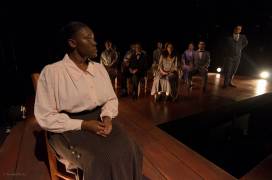 Evelyn Onyango does powerful work on the witness stand as Minnie, while Logan Slater and Khylan Jones sing up a storm as Riley and Angela in the Act Two-opening “Ramblin’ And A Rollin.”
Evelyn Onyango does powerful work on the witness stand as Minnie, while Logan Slater and Khylan Jones sing up a storm as Riley and Angela in the Act Two-opening “Ramblin’ And A Rollin.”
Vocal performances benefit from the accomplished musical direction of David Aks, who conducts a pitch-perfect pit band made up of Ivan Dantas, Isaac Green, Sarah Haylette Ethan Lux, Joe Martone, Gracie McAleer, David Murray, Toby Thomas-Rose, Parker Trent, and Doris Wang.
Svastics’ lighting of scenic designer’s Fred Kinney’s stark but stylish set is downright spectacular. Elizabeth A. Cox’s costumes are likewise as splendid as those she has designed for professional productions around town, and sound designer Kenji Kang’s mix of amped vocals and instrumentals is expert.
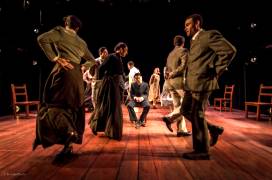 Additional deserved program credits go to Corey Sorensen (vocal coach) and J’aime Morrison (movement coach). Kolawole Obileye, Jr. is stage manager.
Additional deserved program credits go to Corey Sorensen (vocal coach) and J’aime Morrison (movement coach). Kolawole Obileye, Jr. is stage manager.
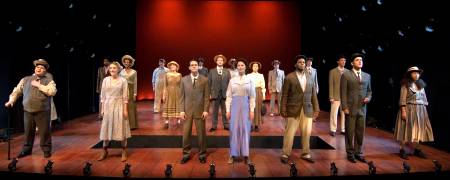
Few if any history-based musicals can match Parade in dramatic impact and emotional punch, and with director-choreographer Kari Hayter in creative charge, a team of professional designers backing her up every step of the way, and above all a dozen-and-a-half gifted performers doing professional-caliber work, this big-stage revival easily matches the best any major regional theater could offer. It deserves its very own parade.

Little Theatre, Nordhoff Hall, Cal State Northridge, Northridge. Through March 20. Wednesday, Thursday, and Friday at 7:30. Sunday at 2:00.
http://www.csun.edu/mike-curb-arts-media-communication/theatre/events/parade
–Steven Stanley
March 16, 2016
Photos: Kenji Kang
Tags: Alfred Uhry, Cal State Northridge, Jason Robert Brown, Leo Frank, Los Angeles Theater Review, Lucille Frank


 Since 2007, Steven Stanley's StageSceneLA.com has spotlighted the best in Southern California theater via reviews, interviews, and its annual StageSceneLA Scenies.
Since 2007, Steven Stanley's StageSceneLA.com has spotlighted the best in Southern California theater via reviews, interviews, and its annual StageSceneLA Scenies.







 COPYRIGHT 2025 STEVEN STANLEY :: DESIGN BY
COPYRIGHT 2025 STEVEN STANLEY :: DESIGN BY